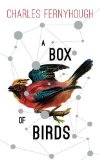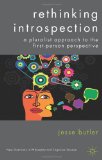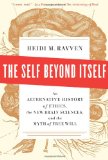May 27, 2013

A Box Of Birds by Charles Fernyhough (Unbound, 2013)
(kindle ed.), (amazon.co.uk)
Book description from the publisher:
Neuroscientist Dr Yvonne Churcher has problems in the world beyond her lab. One of her students, James, a dangerously attractive animal rights campaigner, has set out to challenge her certainties about how the brain works. His brilliant, unstable friend, Gareth, is obsessed with the biochemical basis of memory. When Gareth tries to persuade Yvonne to get involved with a plan to stimulate memory artificially, it sets off a chain of events involving unscrupulous biotech companies, stolen brain-mapping data and a strange brand of eco-terrorism. Set in a near-future world of experimental brain research, A Box of Birds combines the pace of a literary thriller with a darkly intense love story. It brilliantly dramatizes the clash between two of the predominant philosophical positions of our age: the materialist view that science has all the answers and that ‘we’ are nothing more than brain cells and neurotransmitters, and the therapy-inspired view that the stories we tell about ourselves and our pasts have the capacity to change our future. As Yvonne Churcher is drawn towards an ever more complex and disturbing truth, she has to face tough questions. Can neuroscience really change our understanding of who we are? Or are we all at the mercy of our own need to make coherent stories?
See also: Author’s website, Review/discussion at Conscious Entities
Comments (0)
- fiction,new books
May 26, 2013
(Note: “Individual books may have additional territory restrictions, and not all deals are available in all territories. Amazon may modify the selection of books offered at any time.”)
Comments (0)
- Uncategorized
May 25, 2013

Rethinking Introspection: A Pluralist Approach to the First-Person Perspective (New Directions in Philosophy and Cognitive Science) by Jesse Butler (Palgrave Macmillan, 2013)
(kindle ed.), (amazon.co.uk)
Book description from the publisher:
We seem to have private privileged access to our own minds through introspection, but what exactly does this involve? Do we somehow literally perceive our own minds, as the common idea of a ‘mind’s eye’ suggests, or are there other processes at work in our ability to know our own minds? Rethinking Introspection offers a new pluralist framework for understanding the nature, scope, and limits of introspection. The book argues that, contrary to common misconceptions, introspection does not consist of a single mechanism but rather a diverse range of mental states and cognitive processes with a broad spectrum of epistemic properties. Building upon this revised conception of introspection, the book illustrates and analyzes the variety of ways in which we introspectively grasp the contents of our own minds, from the immediate phenomenal knowledge generated by conscious experience to the self-deceptive possibilities enabled by certain kinds of inner speech.
Comments (0)
- consciousness,new books,philosophy of mind
May 23, 2013

The Self Beyond Itself: An Alternative History of Ethics, the New Brain Sciences, and the Myth of Free Will by Heidi M. Ravven (New Press, 2013)
(kindle ed.), (amazon.co.uk)
Book description from the publisher:
Why be ethical? For freedom’s sake; for joy, for pleasure, for a sense of living on in the universe of which one is a tiny, local expression; and for an enhanced sense of agency in a dangerous, unpredictable, and ephemeral existence… Opening oneself to being more broadly acted upon by the world in order to discover oneself within it — surely as a basis for acting more broadly within it — is a paradoxical route to freedom.
—FROM THE SELF BEYOND ITSELF
Few concepts are more unshakable in Western culture than free will, the idea that people are fundamentally free to make good or bad decisions. Scholar Heidi M. Ravven throws a wrench into this conventional view, calling free will a myth that reflects the still-powerful influence of Christian theology on our popular thinking.
The Self Beyond Itself offers a riveting and accessible review of modern neuro-scientific research into the brain’s capacity for decision-making—from mirror neurons and self-mapping to surprising new understandings of the dynamics of group psychology. Ultimately, this research points to the profound, virtually inescapable social influences on moral choices. Ravven shows that it is possible to build a theory of ethics that doesn’t rely on free will yet still holds both individuals and groups responsible for the decisions that help create a good society. Drawing especially on the work of Spinoza, she introduces readers to a rich philosophical tradition that finds uncanny confirmation in modern neuroscience.
Highly readable and wide-ranging, The Self Beyond Itself injects the full weight of modern science into our current, stale discourse on right and wrong.
See also: “The Self Beyond Itself: Further Reflection on Spinoza’s Systems Theory of Ethics” (6-page pdf)
Comments (0)
- cognitive science,new books





